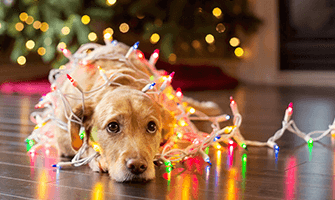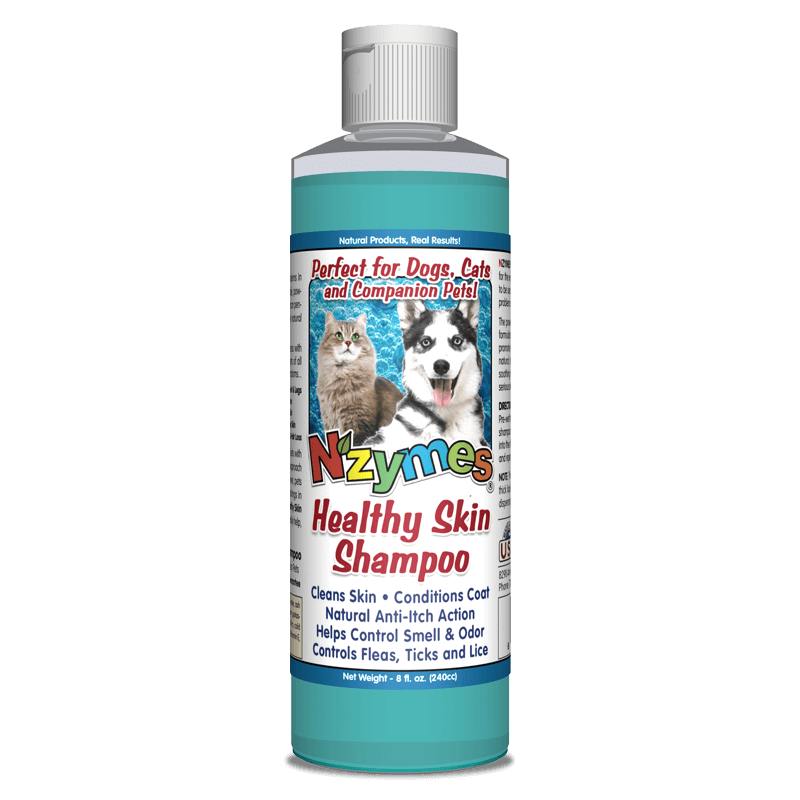
Awareness is Key to Securing a Home from Holiday Pet Dangers
This article on “Holiday Pet Dangers” is offered to enlighten and increase awareness – so that people can enjoy increased safety for their precious pets during holiday seasons. So, as the holidays approach, please keep in mind that this is the most dangerous time of the year for our pets. And, the two most probable dangers are: 1) a lost pet, and 2) pet poisoning.
Fall and Winter Holidays: With the fall and winter holidays come many new faces, guests, and dog sitters. Each time guests enter your home pets are exposed to new levels of stress, both positive and negative. Many pets are locked away from the guests while others are allowed to roam freely among the visitors. Doors, gates, and garages are opened and closed at a feverish rate during the holidays. The opportunity for your pet to get out and explore is surely at paw! After the 4th of July, the winter holidays are the number one time of the year that pets are usually lost. So take some extra holiday precautions.
Determine the Rules for the Season: If your pet is allowed to run free among the guests (which is  only fair, it’s their house too!) make sure that you’re there to answer the door for every guest and introduce them to your pet. Also, you will want to be at the door every time it is open to be sure the pet does not escape.
only fair, it’s their house too!) make sure that you’re there to answer the door for every guest and introduce them to your pet. Also, you will want to be at the door every time it is open to be sure the pet does not escape.
Keep a Closer Eye on Your Pets: If you can normally trust your pet in the yard for a few moments, Try NOT to do this during these holidays. There are more people and pets in the streets and yards and lots of great smells that pets naturally love to investigate! All it takes is an unfocused moment when you turn your head to greet someone and then it happens. Instead of a happy holiday, you have the opposite.
Tell The Guests, and Especially the Children, the Rules for Your Pet: What rooms they are or are not allowed, not to feed the pet scraps (if ten guests feed a 30 lb dog two scraps, you could have a very sick dog), and other rules of the house. Do not let children harass them.
Do Not Ignore Your Pet: With the hustle and bustle of the holidays, pets become stressed – this is a time for extra attention. Take time every hour to stop and say hello! Do not forget to walk them, let them out, feed them, and change the litter box or other daily routines.
Holiday Pet Dangers Include Foods: Alcoholic beverages, candy, chocolate, turkey and fixings, pork, fish, chicken bones, just to name a few  hazards. Be careful when giving bones. They can splinter when chewed and eventually puncture the intestinal tract. Bones purchased in grocery and pet stores are a safe substitute. Never give your pet chocolate. It is highly toxic to animals — causing stomach cramps, constipation or diarrhea. It’s best to keep your pet on its regular diet. It’s common to see dogs with both vomiting and/or diarrhea right after Thanksgiving and Christmas. Some can be seriously ill. Another food related hazard is the plastic six-pack beverage holders; kittens especiall can become entangled in them. Remember to cut them up before putting into the garbage. This will also help the wildlife at the landfills too (especially birds).
hazards. Be careful when giving bones. They can splinter when chewed and eventually puncture the intestinal tract. Bones purchased in grocery and pet stores are a safe substitute. Never give your pet chocolate. It is highly toxic to animals — causing stomach cramps, constipation or diarrhea. It’s best to keep your pet on its regular diet. It’s common to see dogs with both vomiting and/or diarrhea right after Thanksgiving and Christmas. Some can be seriously ill. Another food related hazard is the plastic six-pack beverage holders; kittens especiall can become entangled in them. Remember to cut them up before putting into the garbage. This will also help the wildlife at the landfills too (especially birds).
![]() Holiday Pet Dangers, Paraphernalia: Electric cords, tinsel, glass ornaments, candles, spray-on snow (non-toxic preferred), ribbons, plastic or foil wrapping, etc. can be dangerous to your pet. Cover up or hide electric cords, never let your pet chew on them. Do not tie ribbons around pet’s necks or limbs. Watch out for rubber bands too.
Holiday Pet Dangers, Paraphernalia: Electric cords, tinsel, glass ornaments, candles, spray-on snow (non-toxic preferred), ribbons, plastic or foil wrapping, etc. can be dangerous to your pet. Cover up or hide electric cords, never let your pet chew on them. Do not tie ribbons around pet’s necks or limbs. Watch out for rubber bands too.
Poisonous Plants: Although dogs and cats have a good sense what they can and cannot ingest, accidents do happen. Many plants, including Christmas rose, holly, mistletoe, philodendron, dieffenbachia are toxic to your pet. Always try to keep them out of your pets reach. The smaller the pet, the more risk of toxicity if she ingests a poisonous plant. Some signs of poisoning include vomiting, diarrhea, nervousness, difficulty breathing, and change in pupil size. Your pet may even stumble, go into convulsions, or become unconscious.
Do Not Try to Make Your Pet Vomit: Many times this can make the situation worse, as some poisons actually cause as much damage coming up as they do going down. Comfort your pet and make it feel secure, and immediately take it to a veterinarian. If you know what your pet ingested, take a sample of it to the veterinarian to help determine proper treatment.
Dr. Michael Knight, a veterinarian at the ASPCA’s National Animal Poison Control Center in Urbana, Ill. said: “Poinsettias have a history of being fairly toxic,” says Knight. More recently we’ve found that poinsettias are not what we consider life-threatening at all. “Occasionally, we’ll get a call where a dog has eaten a large quantity of the poinsettia plant. The dog will have some digestive upsets — vomiting and diarrhea — but I don’t think we’ve actually seen any deaths associated with poinsettias over the years — and we’ve gotten hundreds of calls.
“In our opinion, poinsettias are not a hazard to dogs or cats. Neither are holly berries and mistletoe,” says Knight, who added ![]() that the poison control center doesn’t get many calls about pets ingesting holly berries, mainly because the leaves of this plant are thorny and spiny and don’t taste great.
that the poison control center doesn’t get many calls about pets ingesting holly berries, mainly because the leaves of this plant are thorny and spiny and don’t taste great.
Mistletoe is not considered deadly either, but Knight warns that the plant does contain a natural compound that can cause heart problems. But, again, he says the center hasn’t heard of any such cases.
Winter and Pets: It is the time of year to prepare for colder weather, and the changes it brings. And, although pets are prepared for winter by nature some precautions are still necessary. At this time of year pets should not be allowed to run free because the winter is an especially dangerous time. Due to the sound dampening effects of snow, pets often cannot hear cars coming. It is also easier for the pet to become lost and they can easily freeze to death.
 Many pets are bred for cold weather (i.e. Saint Bernard’s, Huskies and some long hair cats) and some are not (i.e. Grey Hounds and some short or hairless cats). Determine the special needs of your pet. Warm weather dogs should only be let outside on cold days for as long as they need to go. Cats, unless on leash, should never be allowed to run free.
Many pets are bred for cold weather (i.e. Saint Bernard’s, Huskies and some long hair cats) and some are not (i.e. Grey Hounds and some short or hairless cats). Determine the special needs of your pet. Warm weather dogs should only be let outside on cold days for as long as they need to go. Cats, unless on leash, should never be allowed to run free.
If your pet has a containment system and will be outdoors during cold days take the following precautions:
- Try to ensure the pet has a warm place out of the elements to get warm.
- Always clean snow and ice from your pet to prevent frostbite.
- Check on your pet often and observe its behavior.
- On the coldest days allow the pet to come indoors or a heated place in the garage.
- Feed them smaller portions and feed them more often (morning and late afternoon feedings) and be sure there is fresh water for them.
- Be sure your pet containment system is not affected by the weather.
- Allow indoor pets outside long enough for exercise and to “go” only.
- Always supervise indoor pets when they are out.
 If cats are known to run free in your neighborhood, remember to tap on your car’s hood before starting it because cats will often climb under the hoods of cars on onto the engine or surrounding area to get warm.
If cats are known to run free in your neighborhood, remember to tap on your car’s hood before starting it because cats will often climb under the hoods of cars on onto the engine or surrounding area to get warm.

